【课件】定语从句用法详解
图片预览
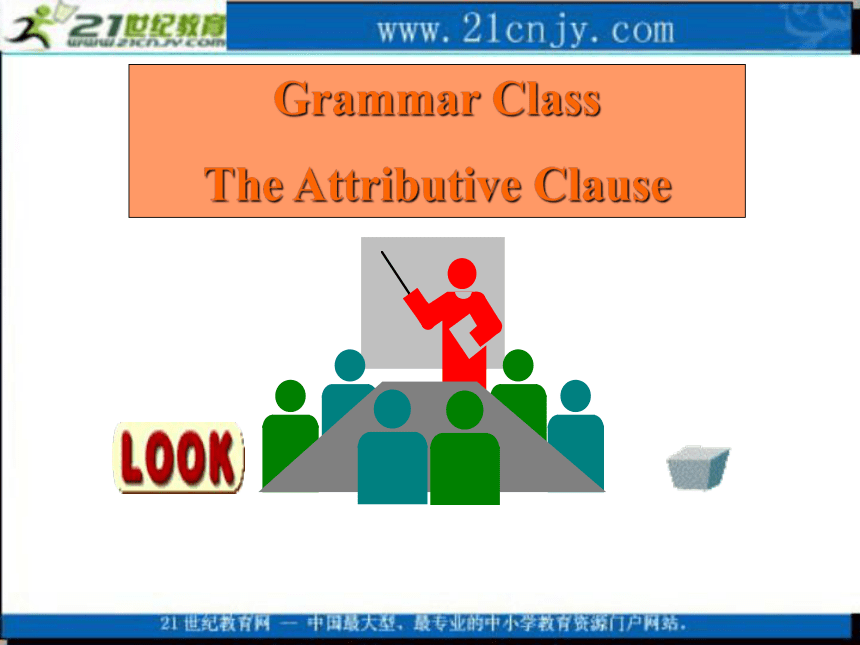
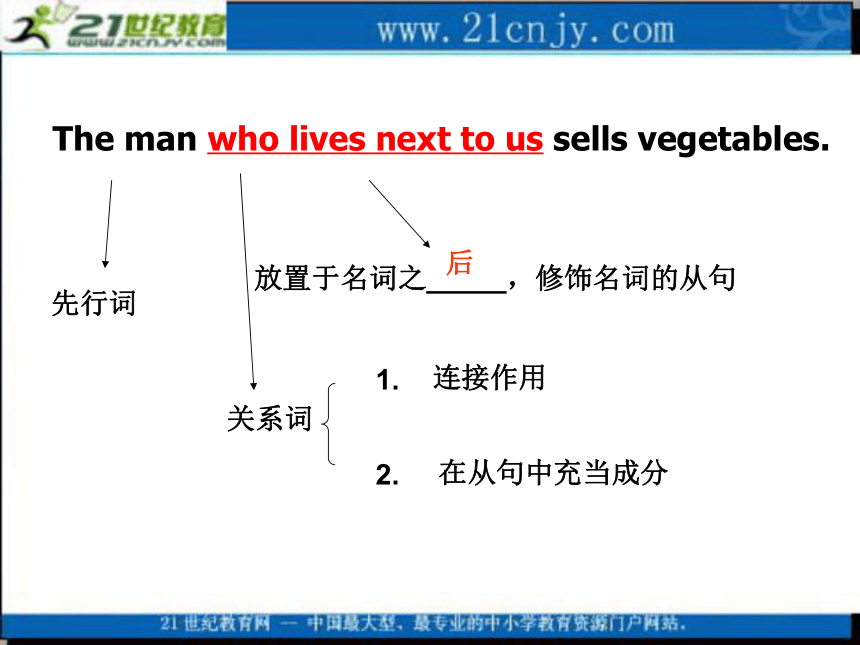
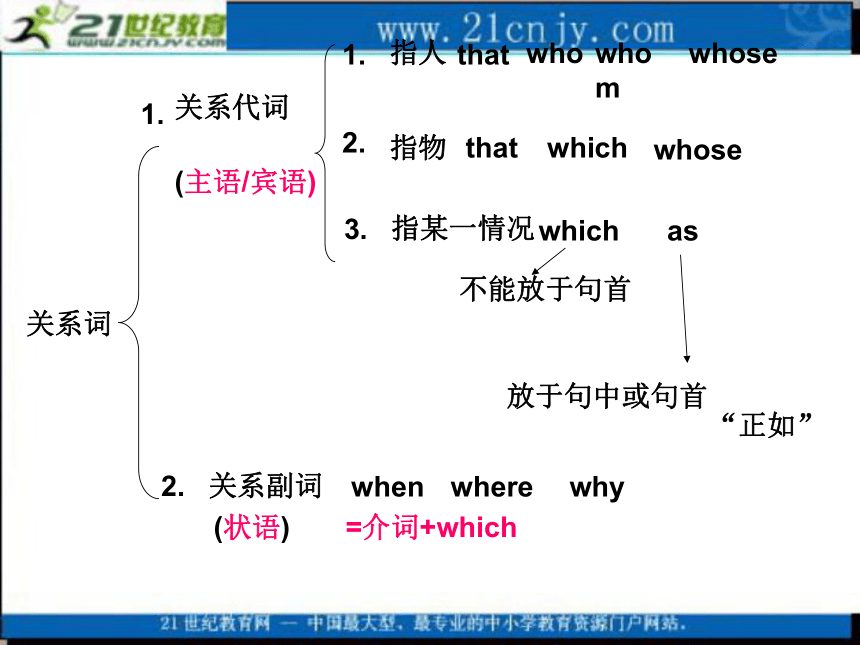
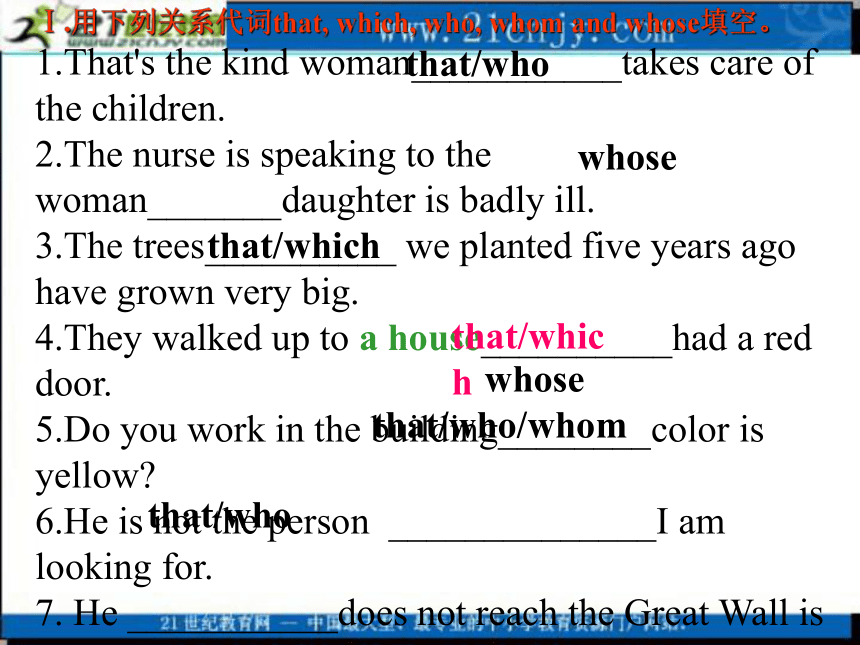
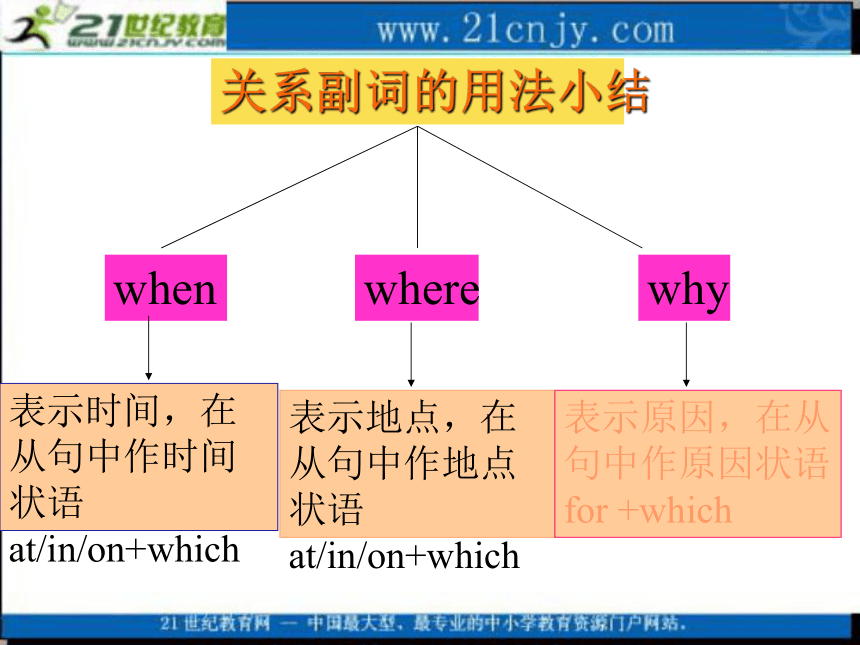
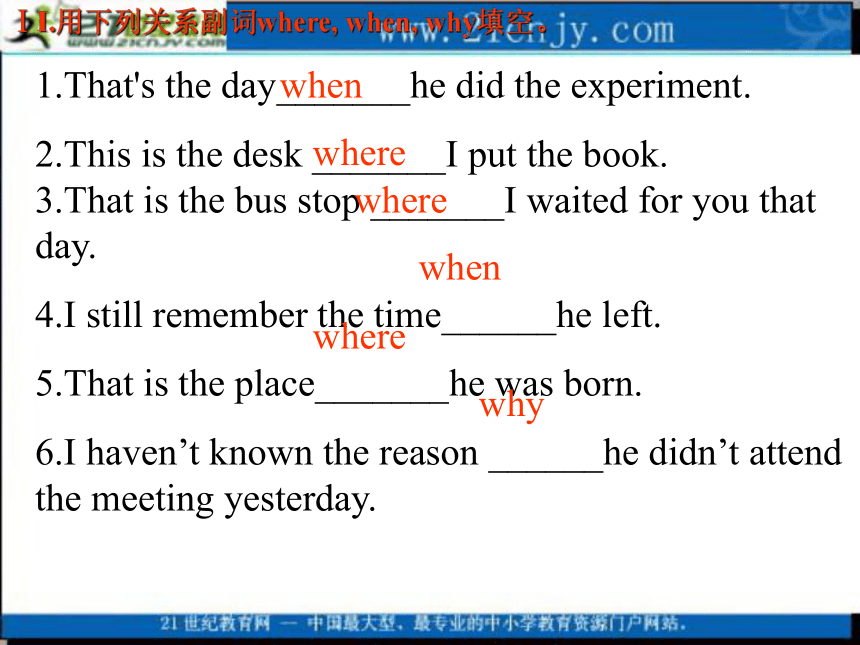
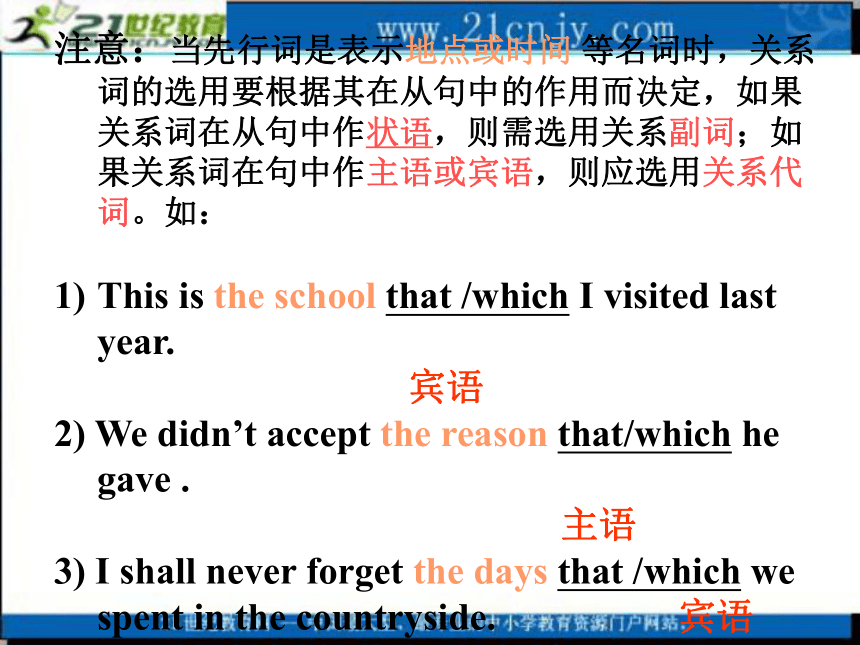
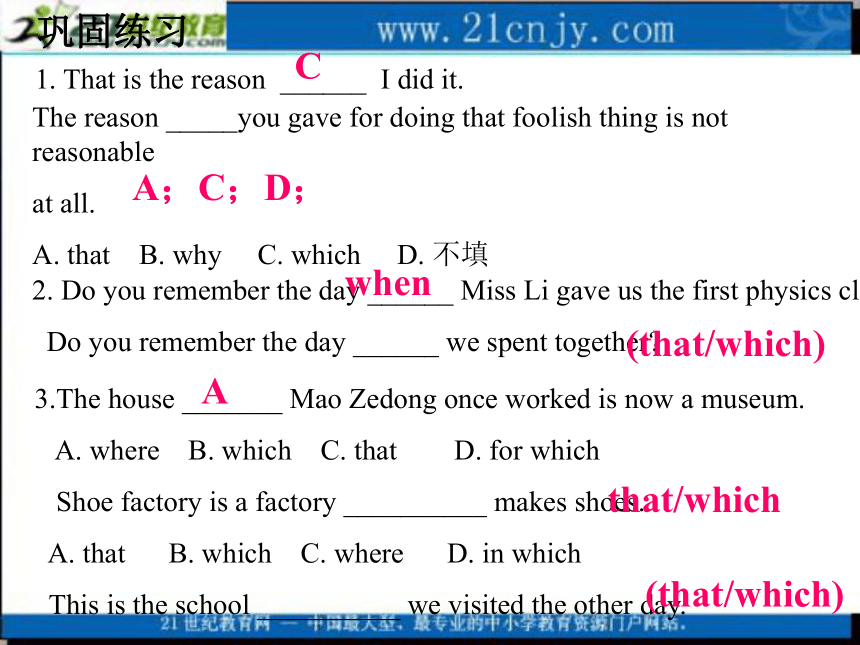
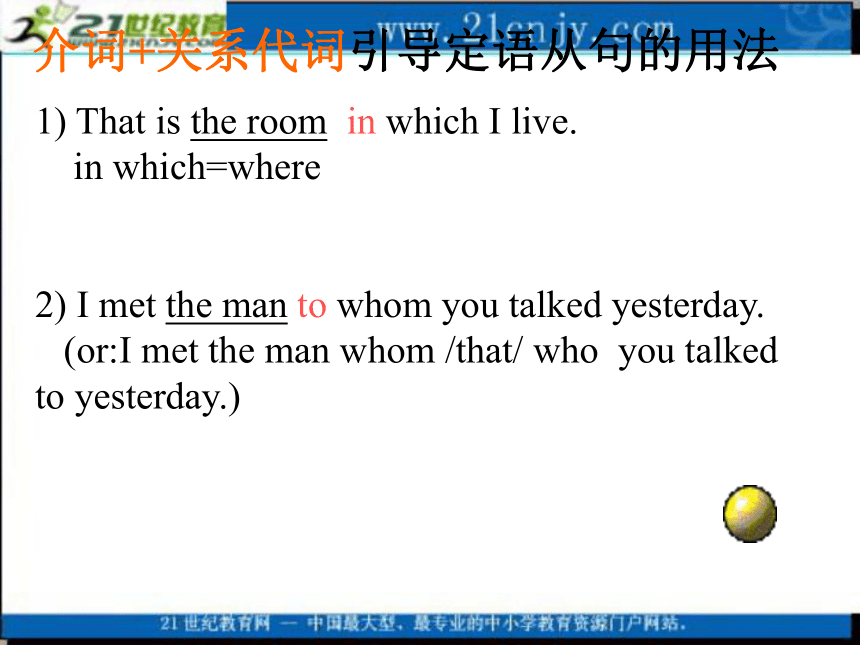
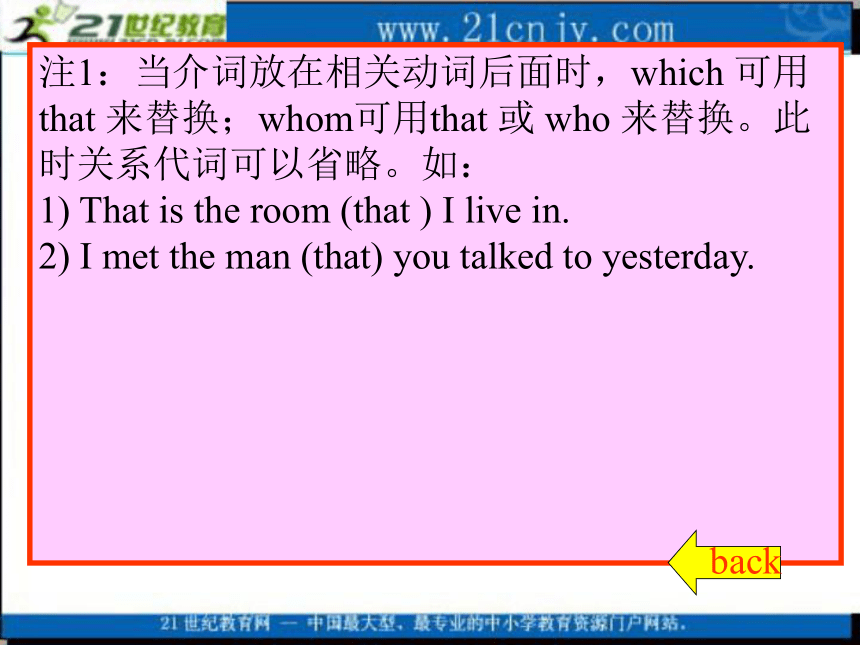
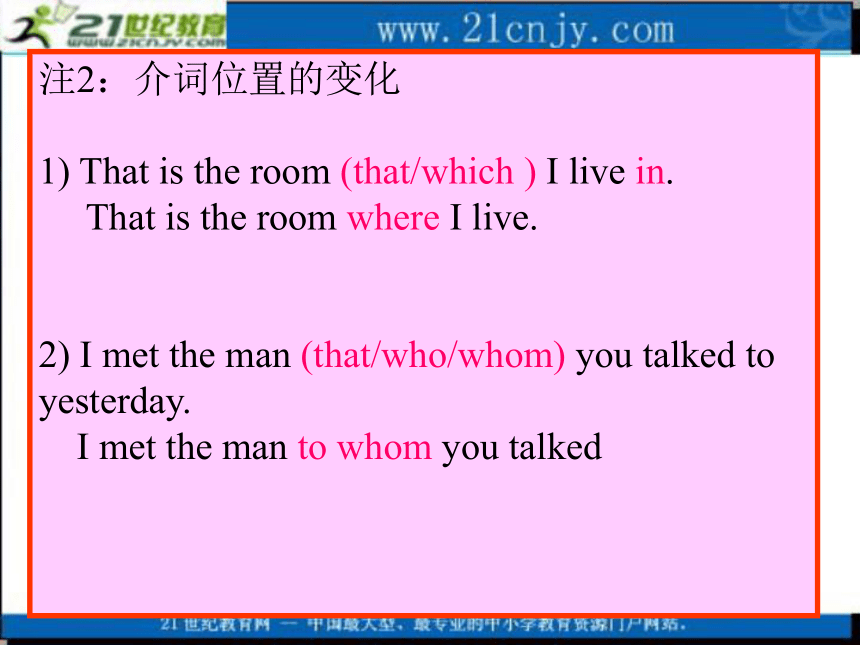
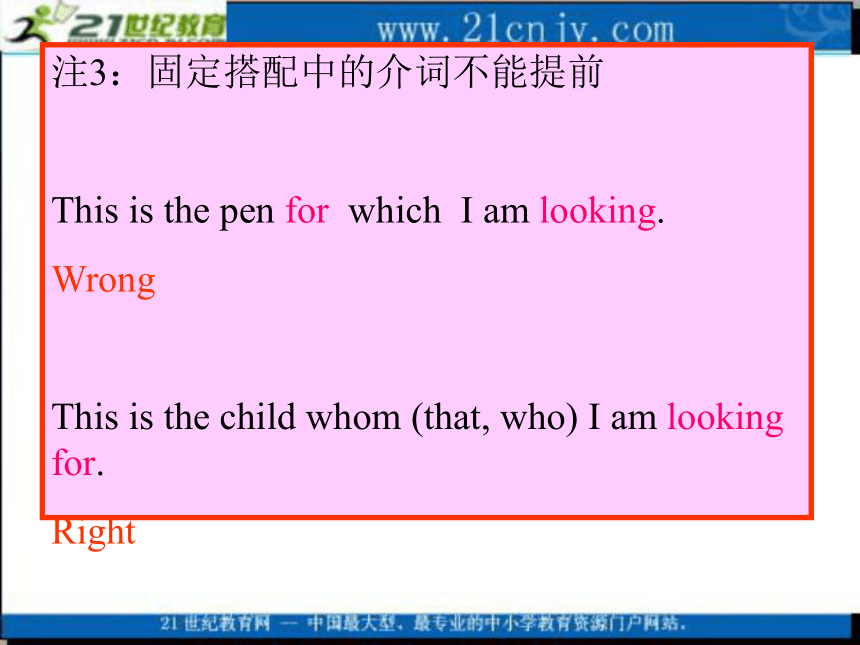
文档简介
课件48张PPT。Grammar Class
The Attributive ClauseThe man who lives next to us sells vegetables.先行词放置于名词之_____,修饰名词的从句关系词连接作用1.2. 在从句中充当成分后关系词1.关系代词2.关系副词1.指人2.指物3.指某一情况thatwhowhomwhosethatwhichwhosewhichas不能放于句首放于句中或句首“正如”whenwherewhy(主语/宾语)(状语)=介词+whichⅠ.用下列关系代词that, which, who, whom and whose填空。
1.That's the kind woman___________takes care of the children.
2.The nurse is speaking to the woman_______daughter is badly ill.
3.The trees__________ we planted five years ago have grown very big.
4.They walked up to a house__________had a red door.
5.Do you work in the building________color is yellow?
6.He is not the person ______________I am looking for.
7. He ___________does not reach the Great Wall is not a true man.that/whowhosewhosethat/whichthat/whichthat/who/whomthat/who关系副词的用法小结when wherewhy表示地点,在从句中作地点状语at/in/on+which表示原因,在从句中作原因状语for +which表示时间,在从句中作时间状语at/in/on+which1.That's the day_______he did the experiment.
2.This is the desk _______I put the book. 3.That is the bus stop _______I waited for you that day.
4.I still remember the time______he left.
5.That is the place_______he was born.
6.I haven’t known the reason ______he didn’t attend the meeting yesterday.ⅠI.用下列关系副词where, when, why填空。whenwherewhere whenwhere why 注意:当先行词是表示地点或时间 等名词时,关系词的选用要根据其在从句中的作用而决定,如果关系词在从句中作状语,则需选用关系副词;如果关系词在句中作主语或宾语,则应选用关系代词。如:
This is the school that /which I visited last year.
宾语
2) We didn’t accept the reason that/which he gave .
主语
3) I shall never forget the days that /which we spent in the countryside. 宾语
4) He told me the date that (which) was the most important to him in his life.主语1. That is the reason ______ I did it. The reason _____you gave for doing that foolish thing is not reasonable
at all.
A. that B. why C. which D. 不填 2. Do you remember the day ______ Miss Li gave us the first physics class?
Do you remember the day ______ we spent together?3.The house _______ Mao Zedong once worked is now a museum.
A. where B. which C. that D. for which
Shoe factory is a factory __________ makes shoes.
A. that B. which C. where D. in which
This is the school __________ we visited the other day.巩固练习CA;C;D;when(that/which)Athat/which(that/which)介词+关系代词引导定语从句的用法1) That is the room in which I live.
in which=where
2) I met the man to whom you talked yesterday.
(or:I met the man whom /that/ who you talked to yesterday.)注1:当介词放在相关动词后面时,which 可用that 来替换;whom可用that 或 who 来替换。此时关系代词可以省略。如:
1) That is the room (that ) I live in.
2) I met the man (that) you talked to yesterday.
back注2:介词位置的变化
1) That is the room (that/which ) I live in.
That is the room where I live.
2) I met the man (that/who/whom) you talked to yesterday.
I met the man to whom you talked
注3:固定搭配中的介词不能提前
This is the pen for which I am looking.
Wrong
This is the child whom (that, who) I am looking for.
Right注4:特例
This is the first time (that)we shall see an English film.
2) The way (that/in which/省略) we did it very was simple.
注5: 不能用what/how引导定语从句
1.The reason_____ _____they did it is quite clear.(根据名词判断介词
2.That is the hill_____the foot_____ ______ they had a rest.
3.The man_____ ______ we spoke was a soldier. (根据动词判断介词)
4.This is the book_____ ________I spent five dollars.
5.There are two things________ ______he was not too sure. (根据形容词判断介词)
6.Water,_______ _______we can't live,is very important.
(根据句义判断介词)
for which to whom of/about which at of whichon which without which用介词加关系代词填空。Ⅲ.判断对错,如有错请改改正:
1. May I use the dictionary that you bought it yesterday?
2. The boy you met just now is my son.
3. This is the room which Li Ming lived two years ago.
4. The house which surface is painted white is our classroom.
5.My mother works in the school where we visited yesterday.
6.The person I want to see is one whom study hard.
7.The day which I was to start arrived at last.
where/in whichwhosewhich/thatwhostudieswhen/on whichⅢ.判断对错,如有错请改改正:
8.I’ll never forget the day when I joined the League.
9. I’ll never forget the day when we spent together.
10. The school in front of that the river is dirty is our school.
11. The boy from who I borrowed the book is his brother.
12.There are lots of students who playing on the ground.
13 This is the pen for which I am looking.that/whichwhichwhom或are单项选择.
1) The man_______his car outside hasn't come back for yet.A.whom he left B.who he left C.who left D.left
2) The place_______I visited before has changed greatly. A.that B.where C.in which D.in that
3) The girl_______have gone to London lives with her grandmother.
A.that her parents B.who her parents
C.whose parents D.her parentsCAC4) China has many islands,_______Taiwan is the largest.
A.in where B.in that C.of that D.of which
5) It was Bob________took Johnny for a thief.
A.that B.of whom C.whose D.whom
6) The book_______Tom wants to buy is shown on the screen.
A.that B.who C.whom D.why
7) We shall attend the meeting_______is to be held tomorrow.
A.which B.when C.who D.whereDAAA8) The office________I work is near the library.
A.when B.where C.that D.which
9) Do you know the reason_______Edison left school?
A.for which B.for that C.why D.A & C
10) This is the hotel_______was built last year.
A.where B.in which C.which D.in that
11) The girl_______talked to was quite bright.
A.we B.which C.those we D.who
12) Everybody_______came was interested in his talk.
A.whose B.that C.who D.B & C
13) Can you think of the way_______we can do less homework.
A.in which B.which C.that D.A&CBDCADD 关系代词指物时,多数情况下既可以用that 又可以用which。如:
1)This is the book that (which) I bought yesterday.
2) Don't read in light that ( which) is too bright. 但在下列情况下,一般习惯于用that 而不用which。a、先行词为all, little, nothing,anything,something everything, much, a few 等不定代词时b、当先行词被all,every,no,some,any,little,much,a few等不定代词修饰时。c、当先行词被序数词或形容词最高级修饰时d 、先行词被the only,the very, the same, the last 修饰时。e、当定语从句修饰用两个或两个以上分别表示人和物的先行词的时候 。f、当主句是以 which 开头的特殊疑问句时,为了避免重复,一般用that 来引导定语从句。g.当一个句子有两个定语从句,其中一个已用which另一个则用that。如:
We bought a present which they made themselves that had never been seen before.
h.在here be或there be结构开头的句子中,多用that。如:
Here's the book that you want. 注意,先行词是人时一般不受上述情况的限制。 但是 a.当主句是以who 开头的特殊疑问句时,为了避免重复,最好不用who来引导定语从句,而用that(宾格可以用whom)来引导。
b.当先行词是those时宜用who。
c.当先行词和定语从句相隔离时宜用who。I met a foreigner in the street yesterday who could asked me questions in Chinese
d.当一个句子带有两个定语从句时,其中一个用that另一个宜用who。The man that you met in the street yesterday is the one who stole your wallet.非限制性定语从句1.限制性定语从句和非限制性定语从句
限制性定语从句 就是先行词在意义上不可缺少的定语,如果去掉,主句就会失去意义或意义不完整。这种从句和先行词的关系十分密切,写时不用逗号和主句分开。
非限制性定语从句和主句的关系并不十分密切,只是对先行词做些附加说明,如果去掉,主句的意思仍然清楚。这种从句和主句之间往往用逗号隔开。在讲话时语调上须停顿。一般不用that引导。 (注意非限制性定语从句中,即使关系代词作宾语也不能省略1)I was the only person in my office who was invited. 我是我们办公室唯一被邀请的人。(如果把从句部分去掉,整个句子的含义就变了)
2) He collected facts that proved the earth and all the other planets moved around the sun.他搜集了证明地球和其它所有的行星围绕太阳运转的事实。 (如果去掉从句,主句就失去意义)Football,which is a very interesting game,is played all over the world. Li Ming,whose mother has been ill for two days,is absent from school today.
2 非限制性定语从句中的一些问题:a.指物时,用which而不用that;
b.指人时主格用who,宾格用whom,物主格用whose(也可指物);
c.另外关系副词when(指时间),where(指地点)也可以引导非限制性定语从句;
d.关系副词why不能引导非限制性定语从句);
e.介词加关系代词常常可以引导非限定性定语从句;
f.as和which的区别。 as 在定语从句中作主语、宾语、或表语。as 常用于the same...as, such... as , as... as和so...as 结构中。as 引导的定语从句常采用省略形式。如:
1)I have never seen such a lazy man as you (are ).我从来没有见过像你这样懒的人。(作表语)
2) Let children read such books as will make them better and wiser.让孩子们读使他们变得更好更聪明的书。(作主语)
3) Take as many as you want.你想要多少就拿多少。(作宾语)
4) Here is so big a stone as no man can lift.这儿有一块没人能搬走的那么大的石头。(作宾语)as引导的限制性定语从句注:the same...后既可以用that 也可以用 as 来引导定语从句, that“同一的”即指同一事物;而后者引导定语从句时,
as“相似”即指同类事物。如:
1) This is the same pen that I lost yesterday.
( This sentence means: This pen is mine. I lost it yesterday.)
2) This is the same pen as I lost yesterday.
(This sentence means: This pen is very much like mine that I lost yesterday. In fact, it isn't mine.)as和which的区别 首先,as和which都可以表示主句在意义上的连贯,在从句中作主语,或用作及物动词的宾语,如,
He married her, which/as was natural.
I was very useful to him, which as he realized.
但下列情况下as和which一般不能互换:as和which的区别1.as既可以指前面提到过的事实或情况,因此as可以放在句首、句末,也可以插入主句中,而which指前面提到的事实或情况,一般放在主句之后(有时也可用as),如:
As our teacher points out, that book is of benefit to everyone.
Heat is a form of energy, as is known to all of us.
This machine, as might be expected, has stopped operating.as和which的区别2.as含有正如、按照、正像之意,as一般用在肯定句中,而which则可以用于含否定意义的句子中,如:
He failed in the exam again, as was expected.?
He failed in the exam again, which was unexpected.as和which的区别3.当关系代词代表主句引起的结果,又做主谓宾补(svoc)结构中的主语时,多用which,如:
He saw the girl, which delighted him.
He didn’t pass the exam, which made his mother angry.as和which的区别4.下列固定结构,一般不能用which,如:
?as has been said before 如前所述
?as often happens 正像经常发生的那样
?as is well known 众所周知
?as will be shown in Fig 3 将如图3所示
?as we know 正如我们知道的那样
?as may be imagined 这可以想象得出来
?as we all can see 正如我们大家看到的那样
as follows定语从句常见错误分析
1)误:The watch which my sister gave it to me as a present was made in Swiss.
2)误:That's the hotel where we spent three days there.
正:The watch which my sister gave to me as a present was made in Swiss.正:That's the hotel where we spent three days .1.定语从句中代词或状语与关系词重复。定语从句常见错误分析2.先行词与定语从句位于动词的主谓关系。1)误:Those who breaks the rule should be punished.
2)误:She is the only one of the students who are able to play the guitar.
正:Those who break the rule should be punished.正:She is the only one of the students who
is able to play the guitar.定语从句常见错误分析3.介词误用。1) 误:This is the very ruler for which I'm looking.
2) 误:The stories about the Long March, for which this is an example , are well written.
正:This is the very ruler which I'm looking for. 正:The stories about the Long March, of which this is an example , are well written.定语从句常见错误分析4.关系词省略错误1. 误:Anyone breaks the law must be punished.
2.误:Is this the factory you worked five years ago?
正:Anyone who breaks the law must be punished. 正:Is this the factory where/at which you worked five years ago?定语从句常见错误分析1. 误:All which you have done is not necessary.
2. 误:Great changes have taken place in the city where we visited last year.
正:All that you have done is not necessary.正:Great changes have taken place in the
city that we visited last year.
定语从句常见错误分析3.误: Mr White is the only person in his office which was invited to the party.
4.误:They are talking about the people and things which they saw on their way home.
正: Mr White is the only person in his office who/that was invited to the party.
正:They are talking about the people and things that they saw on their way home.
定语从句常见错误分析5. 误:This is the very present which my mother gave me.
6. 误:Which is the bike which is made in Shanghai?
正:This is the very present that my mother gave me. 正:Which is the bike that is made in
Shanghai?定语从句常见错误分析7.误: This is the most beautiful dress which I own .
8. 误:Mrs Brown has made the same mistakes like Mr Brown.
正:This is the most beautiful dress that I own . 正:Mrs Brown has made the same mistakes as Mr Brown.
定语从句常见错误分析9. 误:The old man whom I think is dying is really very strong in face.
10. 误:He is not the man who he was before.
正:The old man who I think is dying is really very strong in face.
正:He is not the man that he was before.
定语从句常见错误分析11. 误:The house which roof was damaged has now been repaired.
12. 误:Hangzhou is a city which there is a beautiful lake .
正:The house whose roof was damaged has now been repaired. 正:Hangzhou is a city where there is a beautiful lake . 定语从句常见错误分析13. 误:Those that want to buy the house may sign their names first.
14. 误:My sister, who you met in Guangzhou , has bought a new car.
正:Those who want to buy the house may sign their names first. 正:My sister, whom you met in Guangzhou , has bought a new car.
定语从句常见错误分析15. 误:That's the way which they work.
正:That's the way (that/inwhich) they work.
5.关系词误用
定语从句与强调句型的区别: 2) 误:It was yesterday when he came here.
正:It was yesterday that he came here(强调时间)
3) 误:Was it because he was ill why he didn't come to work?
正:Was it because he was ill that he didn't come to work?(强调原因)
定语从句与强调句型的区别:4)误:It was the war which made the children orphans.
正:It was the war that made the children orphans.(强调事物)
5)It was I that (who) went to the Great Wall with him on Sunday. (强调人)
6)It was me that(who,whom) he cheated.他欺骗的是我。 (强调人)定语从句与强调句型的区别:定语从句的关系词较多,如关系代词:that,which,who(m),whose,as,关系副词where,when,why等。
关联词在从句中所起的作用不同:that在引导强调句型时,在从句中代替被强调部分作主语、宾语或状语;而定语从句中关系代词在从句中一般作主语、宾语、表语(宾语时可省略),关系副词在从句中作状语。
The Attributive ClauseThe man who lives next to us sells vegetables.先行词放置于名词之_____,修饰名词的从句关系词连接作用1.2. 在从句中充当成分后关系词1.关系代词2.关系副词1.指人2.指物3.指某一情况thatwhowhomwhosethatwhichwhosewhichas不能放于句首放于句中或句首“正如”whenwherewhy(主语/宾语)(状语)=介词+whichⅠ.用下列关系代词that, which, who, whom and whose填空。
1.That's the kind woman___________takes care of the children.
2.The nurse is speaking to the woman_______daughter is badly ill.
3.The trees__________ we planted five years ago have grown very big.
4.They walked up to a house__________had a red door.
5.Do you work in the building________color is yellow?
6.He is not the person ______________I am looking for.
7. He ___________does not reach the Great Wall is not a true man.that/whowhosewhosethat/whichthat/whichthat/who/whomthat/who关系副词的用法小结when wherewhy表示地点,在从句中作地点状语at/in/on+which表示原因,在从句中作原因状语for +which表示时间,在从句中作时间状语at/in/on+which1.That's the day_______he did the experiment.
2.This is the desk _______I put the book. 3.That is the bus stop _______I waited for you that day.
4.I still remember the time______he left.
5.That is the place_______he was born.
6.I haven’t known the reason ______he didn’t attend the meeting yesterday.ⅠI.用下列关系副词where, when, why填空。whenwherewhere whenwhere why 注意:当先行词是表示地点或时间 等名词时,关系词的选用要根据其在从句中的作用而决定,如果关系词在从句中作状语,则需选用关系副词;如果关系词在句中作主语或宾语,则应选用关系代词。如:
This is the school that /which I visited last year.
宾语
2) We didn’t accept the reason that/which he gave .
主语
3) I shall never forget the days that /which we spent in the countryside. 宾语
4) He told me the date that (which) was the most important to him in his life.主语1. That is the reason ______ I did it. The reason _____you gave for doing that foolish thing is not reasonable
at all.
A. that B. why C. which D. 不填 2. Do you remember the day ______ Miss Li gave us the first physics class?
Do you remember the day ______ we spent together?3.The house _______ Mao Zedong once worked is now a museum.
A. where B. which C. that D. for which
Shoe factory is a factory __________ makes shoes.
A. that B. which C. where D. in which
This is the school __________ we visited the other day.巩固练习CA;C;D;when(that/which)Athat/which(that/which)介词+关系代词引导定语从句的用法1) That is the room in which I live.
in which=where
2) I met the man to whom you talked yesterday.
(or:I met the man whom /that/ who you talked to yesterday.)注1:当介词放在相关动词后面时,which 可用that 来替换;whom可用that 或 who 来替换。此时关系代词可以省略。如:
1) That is the room (that ) I live in.
2) I met the man (that) you talked to yesterday.
back注2:介词位置的变化
1) That is the room (that/which ) I live in.
That is the room where I live.
2) I met the man (that/who/whom) you talked to yesterday.
I met the man to whom you talked
注3:固定搭配中的介词不能提前
This is the pen for which I am looking.
Wrong
This is the child whom (that, who) I am looking for.
Right注4:特例
This is the first time (that)we shall see an English film.
2) The way (that/in which/省略) we did it very was simple.
注5: 不能用what/how引导定语从句
1.The reason_____ _____they did it is quite clear.(根据名词判断介词
2.That is the hill_____the foot_____ ______ they had a rest.
3.The man_____ ______ we spoke was a soldier. (根据动词判断介词)
4.This is the book_____ ________I spent five dollars.
5.There are two things________ ______he was not too sure. (根据形容词判断介词)
6.Water,_______ _______we can't live,is very important.
(根据句义判断介词)
for which to whom of/about which at of whichon which without which用介词加关系代词填空。Ⅲ.判断对错,如有错请改改正:
1. May I use the dictionary that you bought it yesterday?
2. The boy you met just now is my son.
3. This is the room which Li Ming lived two years ago.
4. The house which surface is painted white is our classroom.
5.My mother works in the school where we visited yesterday.
6.The person I want to see is one whom study hard.
7.The day which I was to start arrived at last.
where/in whichwhosewhich/thatwhostudieswhen/on whichⅢ.判断对错,如有错请改改正:
8.I’ll never forget the day when I joined the League.
9. I’ll never forget the day when we spent together.
10. The school in front of that the river is dirty is our school.
11. The boy from who I borrowed the book is his brother.
12.There are lots of students who playing on the ground.
13 This is the pen for which I am looking.that/whichwhichwhom或are单项选择.
1) The man_______his car outside hasn't come back for yet.A.whom he left B.who he left C.who left D.left
2) The place_______I visited before has changed greatly. A.that B.where C.in which D.in that
3) The girl_______have gone to London lives with her grandmother.
A.that her parents B.who her parents
C.whose parents D.her parentsCAC4) China has many islands,_______Taiwan is the largest.
A.in where B.in that C.of that D.of which
5) It was Bob________took Johnny for a thief.
A.that B.of whom C.whose D.whom
6) The book_______Tom wants to buy is shown on the screen.
A.that B.who C.whom D.why
7) We shall attend the meeting_______is to be held tomorrow.
A.which B.when C.who D.whereDAAA8) The office________I work is near the library.
A.when B.where C.that D.which
9) Do you know the reason_______Edison left school?
A.for which B.for that C.why D.A & C
10) This is the hotel_______was built last year.
A.where B.in which C.which D.in that
11) The girl_______talked to was quite bright.
A.we B.which C.those we D.who
12) Everybody_______came was interested in his talk.
A.whose B.that C.who D.B & C
13) Can you think of the way_______we can do less homework.
A.in which B.which C.that D.A&CBDCADD 关系代词指物时,多数情况下既可以用that 又可以用which。如:
1)This is the book that (which) I bought yesterday.
2) Don't read in light that ( which) is too bright. 但在下列情况下,一般习惯于用that 而不用which。a、先行词为all, little, nothing,anything,something everything, much, a few 等不定代词时b、当先行词被all,every,no,some,any,little,much,a few等不定代词修饰时。c、当先行词被序数词或形容词最高级修饰时d 、先行词被the only,the very, the same, the last 修饰时。e、当定语从句修饰用两个或两个以上分别表示人和物的先行词的时候 。f、当主句是以 which 开头的特殊疑问句时,为了避免重复,一般用that 来引导定语从句。g.当一个句子有两个定语从句,其中一个已用which另一个则用that。如:
We bought a present which they made themselves that had never been seen before.
h.在here be或there be结构开头的句子中,多用that。如:
Here's the book that you want. 注意,先行词是人时一般不受上述情况的限制。 但是 a.当主句是以who 开头的特殊疑问句时,为了避免重复,最好不用who来引导定语从句,而用that(宾格可以用whom)来引导。
b.当先行词是those时宜用who。
c.当先行词和定语从句相隔离时宜用who。I met a foreigner in the street yesterday who could asked me questions in Chinese
d.当一个句子带有两个定语从句时,其中一个用that另一个宜用who。The man that you met in the street yesterday is the one who stole your wallet.非限制性定语从句1.限制性定语从句和非限制性定语从句
限制性定语从句 就是先行词在意义上不可缺少的定语,如果去掉,主句就会失去意义或意义不完整。这种从句和先行词的关系十分密切,写时不用逗号和主句分开。
非限制性定语从句和主句的关系并不十分密切,只是对先行词做些附加说明,如果去掉,主句的意思仍然清楚。这种从句和主句之间往往用逗号隔开。在讲话时语调上须停顿。一般不用that引导。 (注意非限制性定语从句中,即使关系代词作宾语也不能省略1)I was the only person in my office who was invited. 我是我们办公室唯一被邀请的人。(如果把从句部分去掉,整个句子的含义就变了)
2) He collected facts that proved the earth and all the other planets moved around the sun.他搜集了证明地球和其它所有的行星围绕太阳运转的事实。 (如果去掉从句,主句就失去意义)Football,which is a very interesting game,is played all over the world. Li Ming,whose mother has been ill for two days,is absent from school today.
2 非限制性定语从句中的一些问题:a.指物时,用which而不用that;
b.指人时主格用who,宾格用whom,物主格用whose(也可指物);
c.另外关系副词when(指时间),where(指地点)也可以引导非限制性定语从句;
d.关系副词why不能引导非限制性定语从句);
e.介词加关系代词常常可以引导非限定性定语从句;
f.as和which的区别。 as 在定语从句中作主语、宾语、或表语。as 常用于the same...as, such... as , as... as和so...as 结构中。as 引导的定语从句常采用省略形式。如:
1)I have never seen such a lazy man as you (are ).我从来没有见过像你这样懒的人。(作表语)
2) Let children read such books as will make them better and wiser.让孩子们读使他们变得更好更聪明的书。(作主语)
3) Take as many as you want.你想要多少就拿多少。(作宾语)
4) Here is so big a stone as no man can lift.这儿有一块没人能搬走的那么大的石头。(作宾语)as引导的限制性定语从句注:the same...后既可以用that 也可以用 as 来引导定语从句, that“同一的”即指同一事物;而后者引导定语从句时,
as“相似”即指同类事物。如:
1) This is the same pen that I lost yesterday.
( This sentence means: This pen is mine. I lost it yesterday.)
2) This is the same pen as I lost yesterday.
(This sentence means: This pen is very much like mine that I lost yesterday. In fact, it isn't mine.)as和which的区别 首先,as和which都可以表示主句在意义上的连贯,在从句中作主语,或用作及物动词的宾语,如,
He married her, which/as was natural.
I was very useful to him, which as he realized.
但下列情况下as和which一般不能互换:as和which的区别1.as既可以指前面提到过的事实或情况,因此as可以放在句首、句末,也可以插入主句中,而which指前面提到的事实或情况,一般放在主句之后(有时也可用as),如:
As our teacher points out, that book is of benefit to everyone.
Heat is a form of energy, as is known to all of us.
This machine, as might be expected, has stopped operating.as和which的区别2.as含有正如、按照、正像之意,as一般用在肯定句中,而which则可以用于含否定意义的句子中,如:
He failed in the exam again, as was expected.?
He failed in the exam again, which was unexpected.as和which的区别3.当关系代词代表主句引起的结果,又做主谓宾补(svoc)结构中的主语时,多用which,如:
He saw the girl, which delighted him.
He didn’t pass the exam, which made his mother angry.as和which的区别4.下列固定结构,一般不能用which,如:
?as has been said before 如前所述
?as often happens 正像经常发生的那样
?as is well known 众所周知
?as will be shown in Fig 3 将如图3所示
?as we know 正如我们知道的那样
?as may be imagined 这可以想象得出来
?as we all can see 正如我们大家看到的那样
as follows定语从句常见错误分析
1)误:The watch which my sister gave it to me as a present was made in Swiss.
2)误:That's the hotel where we spent three days there.
正:The watch which my sister gave to me as a present was made in Swiss.正:That's the hotel where we spent three days .1.定语从句中代词或状语与关系词重复。定语从句常见错误分析2.先行词与定语从句位于动词的主谓关系。1)误:Those who breaks the rule should be punished.
2)误:She is the only one of the students who are able to play the guitar.
正:Those who break the rule should be punished.正:She is the only one of the students who
is able to play the guitar.定语从句常见错误分析3.介词误用。1) 误:This is the very ruler for which I'm looking.
2) 误:The stories about the Long March, for which this is an example , are well written.
正:This is the very ruler which I'm looking for. 正:The stories about the Long March, of which this is an example , are well written.定语从句常见错误分析4.关系词省略错误1. 误:Anyone breaks the law must be punished.
2.误:Is this the factory you worked five years ago?
正:Anyone who breaks the law must be punished. 正:Is this the factory where/at which you worked five years ago?定语从句常见错误分析1. 误:All which you have done is not necessary.
2. 误:Great changes have taken place in the city where we visited last year.
正:All that you have done is not necessary.正:Great changes have taken place in the
city that we visited last year.
定语从句常见错误分析3.误: Mr White is the only person in his office which was invited to the party.
4.误:They are talking about the people and things which they saw on their way home.
正: Mr White is the only person in his office who/that was invited to the party.
正:They are talking about the people and things that they saw on their way home.
定语从句常见错误分析5. 误:This is the very present which my mother gave me.
6. 误:Which is the bike which is made in Shanghai?
正:This is the very present that my mother gave me. 正:Which is the bike that is made in
Shanghai?定语从句常见错误分析7.误: This is the most beautiful dress which I own .
8. 误:Mrs Brown has made the same mistakes like Mr Brown.
正:This is the most beautiful dress that I own . 正:Mrs Brown has made the same mistakes as Mr Brown.
定语从句常见错误分析9. 误:The old man whom I think is dying is really very strong in face.
10. 误:He is not the man who he was before.
正:The old man who I think is dying is really very strong in face.
正:He is not the man that he was before.
定语从句常见错误分析11. 误:The house which roof was damaged has now been repaired.
12. 误:Hangzhou is a city which there is a beautiful lake .
正:The house whose roof was damaged has now been repaired. 正:Hangzhou is a city where there is a beautiful lake . 定语从句常见错误分析13. 误:Those that want to buy the house may sign their names first.
14. 误:My sister, who you met in Guangzhou , has bought a new car.
正:Those who want to buy the house may sign their names first. 正:My sister, whom you met in Guangzhou , has bought a new car.
定语从句常见错误分析15. 误:That's the way which they work.
正:That's the way (that/inwhich) they work.
5.关系词误用
定语从句与强调句型的区别: 2) 误:It was yesterday when he came here.
正:It was yesterday that he came here(强调时间)
3) 误:Was it because he was ill why he didn't come to work?
正:Was it because he was ill that he didn't come to work?(强调原因)
定语从句与强调句型的区别:4)误:It was the war which made the children orphans.
正:It was the war that made the children orphans.(强调事物)
5)It was I that (who) went to the Great Wall with him on Sunday. (强调人)
6)It was me that(who,whom) he cheated.他欺骗的是我。 (强调人)定语从句与强调句型的区别:定语从句的关系词较多,如关系代词:that,which,who(m),whose,as,关系副词where,when,why等。
关联词在从句中所起的作用不同:that在引导强调句型时,在从句中代替被强调部分作主语、宾语或状语;而定语从句中关系代词在从句中一般作主语、宾语、表语(宾语时可省略),关系副词在从句中作状语。
